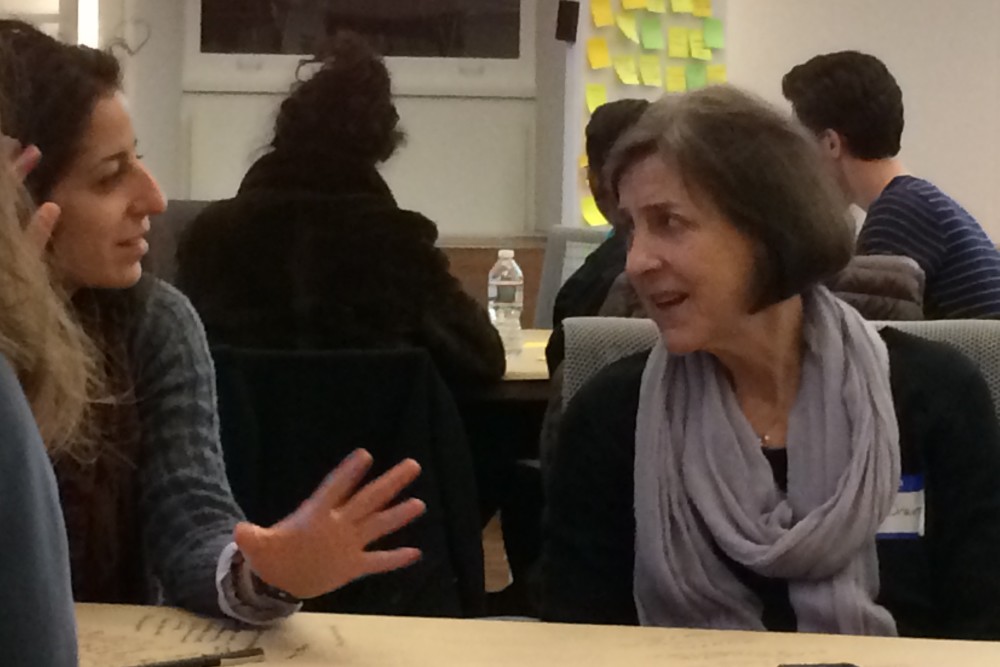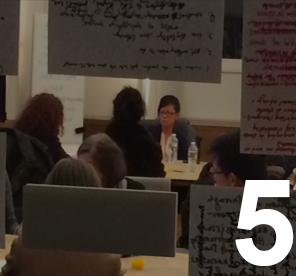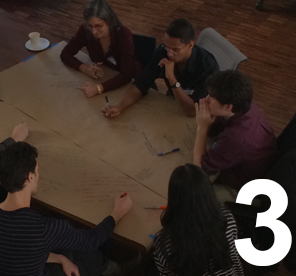Expectations + Takeaways
Category
lab
Date
February 1, 2015
Expectations + Takeaways
Participant Introductions and Expectations
[Exercises (how-to)
Materials
How to do questions
Reason]
Participants came from two distinct backgrounds—storytelling and medicine—with many different types of experiences and expertise, respectively. While sign-up sheets can provide demographic information, we wanted to better understand each other’s more personal reasons for attending. And furthermore, encourage levels of trust and comfort with each other.
Participants introduced themselves to one another through the 5x Why activity. Each person asked the other why he or she was there, five times in a row. There were no follow-up questions to distract the asker from listening. And, after being asked the same question a few times, the participants opened up and gave more personal reasons for attending. Participants then swapped roles, wrote a summary of the five reasons, and then presented their partner’s reason for attending to the larger group.
Afterward we transcribed those summaries, and coded them for common expectations. Most participants were attending the workshop either to develop their own storytelling practice or to push the limits of the intersection of medicine and narrative. A few participants were specifically focused on creating or defining their own health stories, and a few were primarily interested in meeting new people and expanding their creative network.
Here is a sample of what some participants were looking for in the workshop:
“Ellie is a researcher and physician who came out of her desire to gain creative skills to help patients tell their stories, and to share those practices with others in the medical field, as they are currently not trained in these skills.”
“John is here to connect with people considering narrative in space of health and humanity, and engage in conversations about the potential of stories to catalyze a movement towards compassionate care at the end of life.“
“This engagement is a natural evolution of my experience/expertise extracting narrative from unexpected places through innovative technologies. Medicine is a frontier in which natural but uninitiated storytellers speak and listen, and supporting this process is a new creative pursuit that may allow me to apply my skills in novel ways.”
Takeaways
For this activity, we hand-coded the results into groups based on their primary topic and then polarity of the statements. Our goal was to understand what aspects of the workshop resonated with participants and where there were opportunities for improvement.
The group’s final thoughts on the day clustered into three groups—their main focuses were either on change-making, inspiration, or the workshop methods.
• Change-making
A little more than a third of the group focused on tackling the challenges we articulated throughout the day, and how narrative methods might affect the healthcare industry.
“Some good ideas: Interactive and visual platforms by which patients can introduce themselves, relay their experience of their own bodies, and work through and prioritize their experiences of their physical, emotional, and spiritual selves. Physicians can access these “records” as rich text, integrated and personal.”
• Inspiration
Participants with this focus positively reflected on how the elements of the workshop would carry over into their respective practices.
“The art of telling our story is healing and can have a domino effect on the patient, the caregiver, the community, and the disease. So I will, as a professional storyteller, continue to encourage this where ever needed.”
• Methods
Around forty percent of participants focused explicitly on the methodology and activities of the workshop.
“…importance of thinking through narrative and healthcare approaches in mixed settings—needs profs and patients and community”
What did we learn?
Lastly, a few people expressed uncertainty or negative views on the process. Iteration is one of the most important parts of our process, and so we’re working on adjusting future workshops based on that feedback.
“Building a toolkit is complicated”
In this case, we’ll focus on scoping goals of future workshops more appropriately to the available time frame.
“Today here [I] my mind was harvested but I have no idea for what purpose or to what end.”
Transparency is always an important element in collaborative workshops. There’s a line between participant immersion and information that needs to be balanced by a facilitator’s understanding of how to create a collaborative space. Collaborators should feel both candid but also understand that the results of discussion might be used later, perhaps in a more reflective setting.
How To
Here’s text for how you can do it too.
Results


